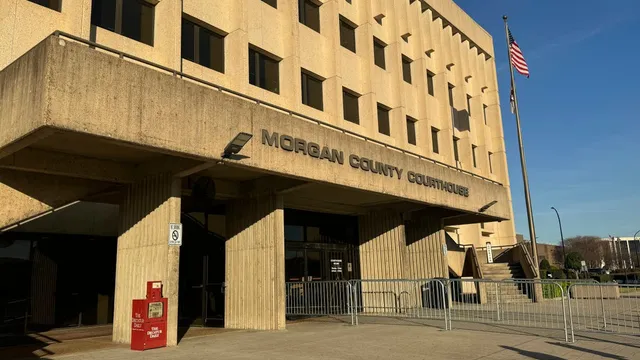
Alabama officer charged with murder after fatally shooting unarmed man
2025-03-26 19:08- The case involves Mac Marquette, charged with murder for the shooting of Steve Perkins during a vehicle repossession attempt.
- Conflicting testimonies arose about whether Marquette had the right to be at Perkins' property when the shooting occurred.
- The outcome of the trial may have significant implications for police accountability and self-defense laws in Alabama.
Express your sentiment!
Insights
In Alabama, the case surrounding the fatal shooting of Steve Perkins by police officer Mac Marquette has brought forth significant legal questions regarding the circumstances of the incident. On September 29, 2023, Marquette shot Perkins outside his home while assisting a tow-truck driver, Caleb Combs, who was attempting to repossess Perkins' vehicle. The events escalated when Perkins allegedly pointed a gun at Combs, leading Marquette to intervene. Body camera footage presented in court supports the claim that Perkins pointed a gun at Marquette just before the officer fired approximately 17 bullets, resulting in Perkins’ death. The legal proceedings, which began with a judge hearing arguments about whether Marquette should be shielded by Alabama’s self-defense laws, underlined the complexities surrounding police use of lethal force. The state's “stand your ground” law permits individuals to use deadly force if they believe they are in danger while in a place they have a right to be. However, the critical question in this case is whether Marquette had the legitimate authority to be on Perkins' property without a court order, as Alabama law prohibits law enforcement from assisting in vehicle repossession without judicial approval if there is a breach of peace. This lack of clarity about the officer’s legal standing has significant implications for the trial. Mixed testimonies arose from the hearings, with prosecutor Garrick Vickery arguing that the officers had no reason to be at Perkins’ home and had exceeded their responsibilities. Defense attorneys contended that their presence was warranted to ensure the peace after Perkins threatened Combs. Witness testimonies varied on whether law enforcement was indeed called for a civil escort or if they were improperly aiding the repossession. Thus, the court must consider whether the officers were acting within their rights by assisting in the repo attempt, which is critical in determining trial pathways. This case has revealed underlying tensions in Decatur, Alabama, a city of about 60,000, where protests have arisen following Perkins’ death, leading to greater scrutiny of police conduct and use of deadly force in similar circumstances. As the trial approaches, public outcry and community engagement highlight the ongoing struggle over law enforcement accountability and self-defense rights in Alabama. The judge, Charles Elliott, has urged calm amid passionate responses in the courtroom. The outcome of this trial is poised to not only impact the involved parties but also shape the dialogue surrounding police policies and the interpretation of stand-your-ground laws in the state.
Contexts
The Alabama Stand Your Ground law is a significant piece of legislation that allows individuals to use deadly force in self-defense without the duty to retreat in situations where they believe their life is in imminent danger. Enacted in 2006, this law positions Alabama among the states that embrace a more permissive approach to self-defense. Under this statute, individuals have the right to protect themselves against perceived threats within their own residences, places of business, or in public spaces. The law emphasizes that no person has a duty to retreat before using force, extending protection to those who feel they are justified in defending themselves from serious harm or death. However, the application of this law is subjected to scrutiny, especially regarding the interpretation of perceived threats and the circumstances surrounding each incident. The justification provided by the Stand Your Ground law extends beyond just preserving one’s own life; it permits the use of force to protect others facing a similar threat. This means individuals may also engage in defensive actions if they reasonably believe another person is under imminent threat of physical harm. Consequently, as these situations unfold, determining the reasonableness of the perceived threat often becomes a focal point in subsequent legal proceedings. Courts in Alabama have dealt with complex cases where the interpretation of what constitutes imminent danger has led to widely varying outcomes in judicial rulings. Critics of the Stand Your Ground law argue that it contributes to a culture of violence and disproportionately affects minority communities. Concerns have been raised about the potential for individuals to misuse the law as a cover for unjustified violence, particularly in racially charged encounters. These critiques are rooted in specific cases that have garnered national attention, sparking debates about the law's ramifications on public safety and justice. As a result, various advocacy groups and lawmakers have called for reforms or modifications to ensure clearer definitions and guidelines regarding self-defense, aiming to balance the right to bear arms with the need to prevent unnecessary violence. In response to ongoing discussions about the implications of the Stand Your Ground law, Alabama lawmakers have occasionally reviewed the provisions but have largely maintained the existing framework. Data regarding the law’s application in real-world scenarios continues to be collected and analyzed, revealing patterns in incidences of self-defense claims. While the ultimate goal of the Stand Your Ground law is to empower individuals to protect themselves without hesitation, the balance of this empowerment against societal safety is a complex and evolving discussion in the state of Alabama.